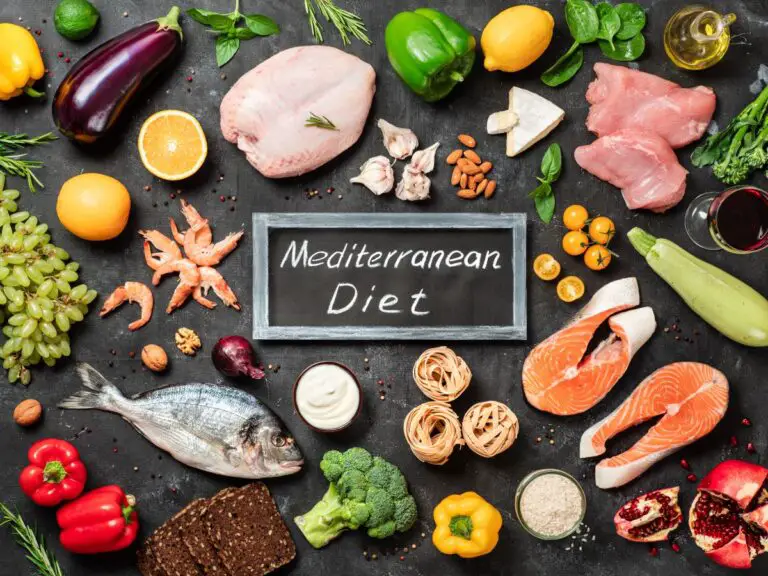Does the Mediterranean Diet Work?
When you start thinking about introducing a new diet to your daily habits, it can be very overwhelming to find one that works for you. There are so many different diets out there, all claiming that they can help you lose weight or decrease certain adverse health conditions. The truth is, you need to do your research before instituting a new diet because they can affect people in different ways, and they may not be targeting the right goal you are after. That’s why, in this article, I’ve collected all the information on what the Mediterranean diet is and whether or not it works.
So, what is the Mediterranean diet? The Mediterranean diet is a plant-based eating plan that consists of whole grains, fruits, vegetables, olive oil, herbs, spices, beans, and more, with the main proteins being fish and seafood. Oftentimes, people will follow this diet if they have chronic conditions like heart disease or high blood pressure as it can help decrease the risks of having a heart attack, depression, or even dementia.
Defining whether or not a diet or eating plan works will depend on the goal of following the plan. If your goal is to reduce the risk of cardiovascular disease, increase/improve lifespan, and healthy aging, the Mediterranean diet has shown to be effective. It can also help support healthy weight loss when used in conjunction with safe caloric restriction.
Let’s talk more about what following this meal plan looks like so you can decide if it’s something you want to do!

What Is the Mediterranean Diet?
Based on traditional foods that people eat in the countries that border the Mediterranean Sea: France, Italy, Greece, and Spain, the Mediterranean diet consists of high quantities of fruits and vegetables and heart-healthy fats. This diet was discovered when researchers noticed the healthy lives of those living in these areas and how many of them had no chronic health conditions.
The Mediterranean diet is less restrictive than other diets, so many people find it easier to follow. Plant-based foods like whole grains, legumes, fruits, nuts, seeds, herbs and spices, and vegetables are the foundation of the diet, with olive oil as the main source of fat. Fish, seafood, dairy, and poultry are the added sources of protein, in moderation.
One of the main ideas of the diet is to use healthy fats instead of unhealthy fats, i.e. olive oil instead of butter. Consisting of unsaturated fat, olive oil helps to lower cholesterol.
If you’re thinking about introducing the diet to your system, get started or do a trial run by: building meals around vegetables and whole grains, reducing your red meat intake, using olive oil instead of butter when preparing foods, and eliminating processed foods and added sugar. If it’s something you find easy to incorporate, try it out on a more regular basis.
Benefits of the Mediterranean Diet
The benefits of following the Mediterranean Diet are quite extensive, especially compared to other diet options out there. Here are some of the main benefits that will result from starting the Mediterranean Diet:
- Promotes Heart Health: the Mediterranean diet has shown effectiveness at slowing plaque buildup in the arteries. This is a major risk factor for heart disease; it has also been shown to lower blood pressure, which helps support heart health.
- Preserves Brain Function: with a strong adherence to the Mediterranean Diet, studies have shown there are improvements in memory, cognitive function, attention, and processing speed with older adults, as well as reductions in risk factors associated with Alzheimer’s.
- Protecting Against Type 2 Diabetes: by following a diet that contains nutrient-dense foods, you can help stabilize blood sugar levels which helps to protect against type 2 diabetes.
Foods to Eat When Following the Mediterranean Diet
Though there are some variations in which foods are included in the Mediterranean Diet between countries, it is agreed upon that the diet is high in healthy plant foods and low in most animal products and meat (apart from fish and seafood). In addition to the food intake aspect of the Mediterranean Diet, it is recommended to include regular physical activity to further improve your body’s functions.

So, specifically, what foods should be included in your Mediterranean Diet?
- Fruits: peaches, apples, bananas, grapes, strawberries, oranges, pears, etc.
- Vegetables: broccoli, kale, cucumbers, potatoes, carrots, tomatoes, spinach, Brussel sprouts, etc.
- Whole grains: oats, corn, whole wheat bread and pasta, brown rice
- Healthy fats: olive oil, avocados, olives
- Fish and seafood: salmon, shrimp, clams, crab, mussels, trout, tuna, mackerel, sardines
- Nuts and seeds: almonds, macadamia nuts, hazelnuts, cashews, walnuts, peanut butter, sunflower seeds
- Legumes: beans, chickpeas, lentils, peas
What Foods Should Be Avoided?
- Added sugar: soda, candies, syrup, baked goods, ice cream
- Trans fats: margarine, processed foods, butter
- Processed foods: fast food, granola bars, deli meats, hot dogs,
Another thing to keep in mind when following the Mediterranean diet is your beverage choices. Drinking a fair amount of water throughout the day is important for your overall health, a moderate amount of red wine is good for heart health, and coffee and tea without sugar and cream additives are great options.
Caloric Intake and the Mediterranean Diet
Most of the time, when people are considering following a new diet plan, their purpose is to lose some weight. While we should all be mindful of our bodies and do our best to take care of them, there are some seriously dangerous ways to lose weight.
Counting calories, though relatively important, can sometimes unintentionally lead to unhealthy mental challenges like eating disorders. This is why everything in moderation is important.
If you are starting the Mediterranean Diet as a way to lose some weight, consider asking someone you trust to be an accountability partner. Maybe they will choose to do the diet with you, or they may be there to help you stick with your goals in a healthy manner. You should also do your research and even talk to a professional who can help you determine a healthy caloric-intake level to stay within.
Calculating an appropriate caloric-intake level should be based on your current weight, goal weight, level of daily activity, gender, height, and age. Once you can determine your caloric-intake goal, slowly begin to incorporate that with your diet.
All of a sudden dropping a few hundred calories from your daily intake is not a good idea as it can affect a lot of things and make following your diet much more difficult.
A great way to begin restricting your calories is to break up your meals and add some healthy snacks in-between. You can also add some light fasting such as only eating between the hours of 8 AM and 8 PM. As you slowly begin to incorporate these aspects of your Mediterranean diet, you will see it become a habit and will start to see progress – just remain patient and keep working.
Takeaways
The Mediterranean Diet is high in plant-based foods, healthy fats, and fish and seafood for a protein that helps to reduce the risk of heart disease and protect brain function. There are no significant rules or restrictions that must be followed – you can use the diet in a way that works for you.
If you are not a fan of salmon or sardines, but you like whole wheat pasta – start creating a menu that incorporates the Mediterranean foods you love.
Diets are most successful when you stick to them, so finding a trusted partner to join you or hold you accountable is a great way to ensure you follow the plan. In the same way, incorporating regular exercise, it doesn’t have to be strenuous, will help you visually see more progress in your health.
Remember that suddenly restricting your diet or calories can have the opposite of the desired effect, making it more difficult to reach your goals. Take it slowly, changing things gradually until it becomes more of a habit – all of a sudden you will realize you’re already eating better.

Related Questions
What kind of exercise is good to do in conjunction with the Mediterranean diet? Ultimately, it is up to you what kind of exercise you want to add to your daily routine. Either way, it doesn’t have to be strenuous – you can simply start taking walks after work! If joining a gym or finding a group to do something together is easier for you, go for it! Just as you adapt the diet to your likes and dislikes, you can do the same with exercise/physical activity.
Is it okay to drink wine while doing the Mediterranean diet? Yes, it is! However, remember that everything is better in moderation. Red wine is a staple in the Mediterranean countries and has been shown to help reduce the risk of heart disease. Depending on your lifestyle, having a glass of red wine regularly – whether that is daily, weekly, or every few days, will not be detrimental to your diet and can be something you look forward to!

